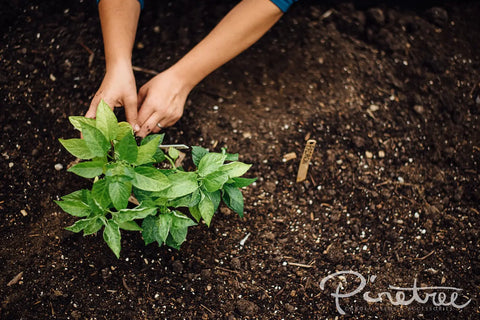Did you know, there's a bacteria in your garden soil that actively prevents stress and inflammation?
There's no better flavor than that of veggies picked fresh from your own backyard. Enjoying the harvests you've worked hard for, plucking the ripened fruit at just the perfect time, and knowing that what you're about to eat has been handled only by you, really 'beets' most of what you can gather while wandering the produce aisle at your local supermarket.
Grocery costs have risen over 14% while most American households are still living paycheck to paycheck! The fallout of the pandemic, worker shortages, and climate change have all contributed to growing costs in stores. The average markup on a piece of pre-cut produce is 40%!
Then factor in the shipping, the crating, and the handling from truck, to display and all the other shoppers, and suddenly that daydream of freshly harvested veggies is all the more appealing - and it's not as difficult as you think!
Here's what makes growing your own vegetable garden so special:
- You can start a garden in a size that suits you best! Herbs on your windowsill, tomatoes in a pot on your patio, or a hanging pepper plant basket are all great for beginners. A raised bed will give you control over the soil quality and a good amount of growing space. Or, go all in if you've got the land! Whatever you've got to work with, there's something you can grow.
- It leads to discovering new (and delicious) parts of the plants you already love: Sweet potato leaves are excellent sautéed with a bit of olive oil and garlic and the leaves that have blanched your cauliflower all season are hearty and nutritious!
- Keeping things organic is actually something you can control! You decide what gets put on your crops and you know EXACTLY where your food comes from.
- Everything you would normally dispose of can now be re-incorporated into next years garden. Plant waste can be added into a compost pile! Here are a few tips to get started. Don't feel like composting at home? Try googling your zip code - you'll likely find a good resource for how to contribute to composting in your local area.
- Eating a diet rich in vegetables has a profound impact on your health:
- and the list goes on and on.
But you already knew all that. Let's get into the geeky stuff🤓
Gardening reigns supreme as one of the best hobbies for your overall mental health. It's a physical activity that requires consistency and dedication, and continuously stimulates the learning center of your brain - the hippocampus. It's even been linked to reducing the symptoms of dementia!
But it's the soil, that really boosts your mood. Well actually, it's the bacteria - the good kind!
Mycobacterium Vaccae is a bacteria found in soil that's been studied for over 30 years due of it's mood boosting effect. It contains a fatty acid, or lipid, that binds to a particular receptor inhibiting the pathways that drive inflammation, thus reducing stress signals or feelings of anxiety...it's nature's Prozac.
Christopher Lowry is the Integrative Physiology Professor at the University of Colorado in Boulder and an accomplished author who's published multiple studies linking healthy dirt bacteria to improving mental health. He affectionately refers to these good bacteria as 'old friends.'
His theory is that between advancements in equipment and a shift in societal standards, humans have gotten away from working directly with soil or spending time outdoors, and as a result, have reduced their exposure to this good bacteria - the kind that bolsters our immune systems. The more we spend time with these 'old friends,' the better our mental and physical health becomes. Which means, getting your hands dirty actually helps to clear your mind.

Speaking of old friends, our favorite podcaster Joe Gardener recently interviewed the President of the Pennsylvania Horticultural Society Matt Rader. (Check it out here).
The PHS focuses largely on community gardening offering classes, resources, connecting neighborhoods and even cleaning, 'greening' and maintaining community lots.
For Matt, the message is simple:
“Every person planting and growing something is using a super power to help improve the health of all of us!”
We couldn't agree more. From patio planters to six-foot luffa trellises, every little bit counts. So come on, channel your inner superhero (Marvel or DC, we don't discriminate) and start your own vegetable garden this season.
There's no time like the present to start building a better tomorrow🌱
Happy gardening!
Sources:
Healthy, stress-busting fat found hidden in dirt - Science Daily, Mycobacterium Vaccae - Science Direct


Hi Debie,
While we don’t offer any products that could work as replacements for commercial egg layer pellets, many of our staff members who have chickens use a variety of Microgreens and Grasses to supplement their chicken’s diets. Broccoli Microgreens (SKU# W405M) and Arugula Microgreens (SKU# W25701) are great options, as is Wheatgrass (SKU# 99003) and many others!
I would like to know what I could grow for chicken feed to replace commercial egg layer pellets as they increase prices during hard times projected to come up this year.
Hi Barbara,
Does your friend use a computer? You can simply share the link to this webpage!
I wold like to send a copy of. this blog to my friend. how do I do this?
I’ve been following Joe Gardner (aka Joe Lampl) for years. He gives tons of great advice and has the knowledge to help everyone learn to garden and sharing information with those of us who have gardened for years. My son was recently diagnosed with a terminal disease and if I didn’t have my garden through this time I don’t know what I would have done. It’s my place to go to to just be if that makes any sense. Thank you for your quality products, makes for a good start in my garden.